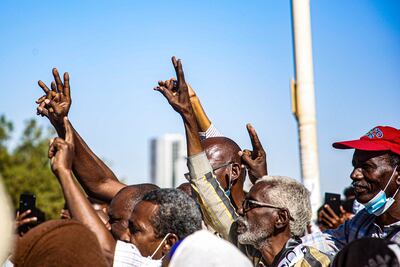Sudanese Prime Minister Abdalla Hamdok has announced the sacking of the country's top police officers one week after he returned to office after a deal with the military.
Activists have blamed police for the deaths of at least 40 protesters during rallies staged since the military coup on October 25 that overthrew Mr Hamdok's civilian government and derailed the country’s transition to democracy under a military-civilian administration.
In a statement issued on Saturday, Mr Hamdok said he had sacked police chief Khaled Mahdi Ibrahim Al Emam and his deputy Ali Ibrahim. He appointed Anan Hamed Mohamed Omar as the new police chief and Abdel Rahman Nasreddine as his deputy.
He gave no reason for the dismissals, which came only days before more street rallies on November 30 against the military's role in politics and the deal that reinstated the prime minister.
Police have denied using live rounds against protesters, insisting that they used only tear gas and rubber bullets. However, medics and activists accuse officers of using live rounds and aiming them mostly at the head, neck and torso.
In some cases, they said, tear gas canisters caused serious injuries and, in at least one incident, killed a protester.

Activists say the police’s heavy-handed tactics could not have been used without the approval of Sudan’s leading general and coup leader Abdel Fattah Al Burhan.
Significantly, there has not been a single death in the protests staged since Mr Hamdok was reinstated on November 21, although scores of protesters have been injured.
Mr Hamdok’s reinstatement has been met with opposition from Sudan’s powerful, pro-democracy movement, which contends that it has legitimised the coup and guaranteed an even bigger political role for the military. Mr Hamdok himself has been the target of scathing criticism, with many now viewing him as a cover for direct military rule led by Gen Al Burhan.
Mr Hamdok said he agreed to the deal to stop bloodshed, protect the economic gains secured through reforms that increased the hardships endured by most Sudanese and to ensure that the democratic transition was successful.
The November 21 deal also provides for the release of politicians, union leaders, journalists and activists detained after the takeover. Authorities have been releasing some of those detained since October 25 but many remain incarcerated despite assurances by Mr Hamdok last week that they would all be freed within two days.
The Forces of Freedom and Change, a loose pro-democracy alliance that served as the political sponsor of the prime minister's ousted government, said some detained politicians and senior members of Mr Hamdok's administration were on hunger strike to protest their continued imprisonment.
In a separate development, the Sudanese Congress party said on Sunday that leading member and former industry minister Ibrahim Al Sheikh was rearrested at his home after his release last week.
The pro-democracy movement is demanding that Gen Al Burhan and his associates stand trial for overthrowing a legitimate government, which came into office after a power-sharing agreement between the military and the FFC in August 2019, four months after street protests forced the generals to remove dictator Omar Al Bashir.


